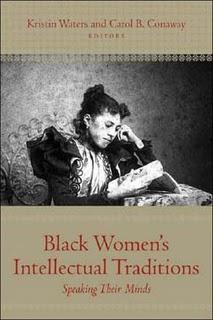Black Women’s Intellectual Traditions: Speaking their Minds

While reading this collection, I recalled when I was in a debate with a male writer about where were the intellectuals and poets from the Black Arts Movement. I named Mari Evans and was dismissed. Never mind that Cheryl Clarke, June Jordan and Audre Lorde could have also been a part of that list. Conversations like those compel me to search for the narratives, the histories and the primary sources that preserve, document and celebrate the creative and intellectual legacies of women of color. Black Women’s Intellectual Traditions is one of many books working to fill an earlier gap than the Black Arts Movement to reveal a continuum of Black literary, critical and analytical thought. In nineteen essays and excerpts from larger texts, the book offers background and delves into the lives and work nineteenth and early twentieth century activists and speakers - like radical essayist Maria W. Stewart, Sojourner Truth, slave narrative author Harriet Jacob/Linda Brent, novelist and poet Frances E.W. Harper, scholar and educator Anna Julia Cooper and journalist Ida B. Wells.
Waters addresses each of the women chronologically and then concludes with a survey of issues addressed and organizing and rhetorical strategies used by women then and today to articulate their feminism/womanism on their own terms - rather than according to the irrelevant social constructs of the True Womanhood movement, which pertained more to notions of pure white femininity than the dual struggles of being black and woman. There is also some talk of the “Lift As We Climb” movement based in the Colored Women’s Club Movement and the tenets of hard work, upright living and service to one’s community. My suggestion for two books with excellent timelines to support this book’s claims and analysis would include When and Where I Enter by Paula Giddings and Too Heavy A Load by Dorothy Gray White. These books and many other scholars as well are cited in this thorough analysis.
Many of the essays hinge upon the critical work by Patricia Hill Collins, particularly her text Black Feminist Thought. Since there is a range of contributors (work by a number of other scholars such as Beverly Guy-Sheftall, Angela Y. Davis, bell hooks, Gerda Lerner, Akasha Hull and Barbara Smith are cited), I found myself wondering how using ideas by these women might have changed the overall direction of the book. Readers may want to start with Hill Collins’ chapter to get a better grasp of the book’s overall intent.